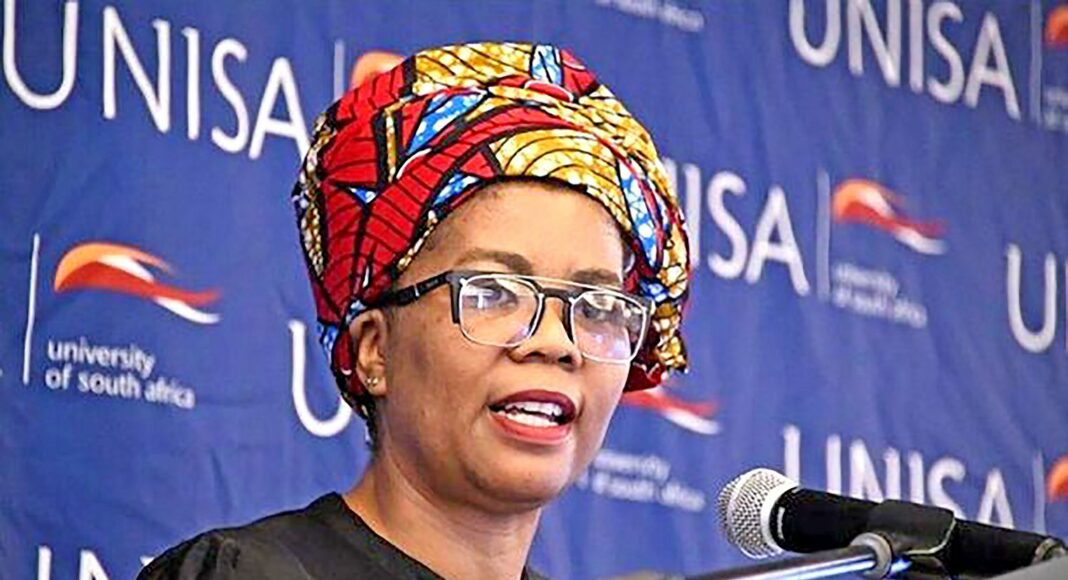The problems at Unisa and the collapse of governance and management did not begin with the current vice-chancellor (VC) Prof Puleng LenkaBula but her predecessor Prof Mandla Makhanya and the council that took over during his tenure.
This is according to former Unisa vice-chancellor Prof Barney Pityana, who was speaking to Sunday World this week as a leaked report of an independent assessor’s investigation made rounds in academic and media circles.
Pityana has called for the Minister of Higher Education, Science and Innovation Dr Blade Nzimande to remove the council, LenkaBula and the executive management.
Pityana, who was the first black vice-chancellor of Unisa from 2001 to 2010, said he was relieved that the report by Prof Themba Mosia made it clear that Unisa’s implosion did not begin with the current vice-chancellor, LenkaBula.
“Prof Makhanya admits this himself in the report,” he said referring to a section in the report in which Mosia interviewed Makhanya.
“It is undeniable that the VC [LenkaBula] inherited many problems when she assumed the position in January 2021,” Mosia writes in the section of the report that deals with Makhanya.
Mosia quotes one of the people he interviewed: “The rather chaotic ending of the previous council and the establishment of the new one was the defining
moment in the unravelling of Unisa … What was worrying me was this issue of people who are hungry, who are consultants … We had hustlers and people with no university experience.”
Pityana said thepeople who were brought in were either very young or recent former students.
“They were very controversial and very much part of cabals, including the previous council chairperson [Sakhi Simelane], who was brought in at the same time and had absolutely no knowledge of a university, no idea of leadership anywhere. He has never led anything anywhere in the world,” Pityana said.
“Makhanya, himself said that he decided at that point that there was nothing he could do. He said he just left it as it was. It was just too much for him,” he said.
“Makhanya allowed council to do as it pleased. There was a flouting of governance. There were people as heads of finance with no financial expertise, or ICT with no understanding of ICT,” he said.
“They have downgraded the conditions of being a professor. If you say you are professor from Unisa no one takes you seriously,” he said.
“Bring in an administrator with a team of experts in administration, management and higher education. Repopulate the university in significant ways. Give the administrator five years, not a year or two as usual, with the help of experts.
“In five years’ time the university should be at a place where a new VC can be appointed and a new council set up,” Pityana said.
However, Dr Seán Muller, senior research fellow at the Johannesburg Institute of Advanced Study based at the University of Johannesburg, does not support the call to fire LenkaBula, saying the case against her is weak.
He noted that the governance and management issues pre-date LenkaBula. He expressed concern at the inconsistency in the way in which the conduct of different vice-chancellors were treated in South Africa.
Expressing dismay that the public’s attention has been directed to “small parts”, which relate to the vice-chancellor, Muller said a stronger case in the 300-page report was against council. “At Stellenbosch we have a vice-chancellor [Prof Wim de Villiers] who has
admitted to using his discretionary powers to admit a relative to the university, which satisfies the standard definition of nepotism.
“We’ve seen senior figures coming out to defend the Stellenbosch VC and the university is running an internally driven process. Whereas at Unisa, the media is reporting on these aspects of the report in relation to the VC in a much more definitive way.
“Now that I’ve seen the report, it substantiates my view that the reports against LenkaBula is misleading.
“I would say the case against her as the VC based on the report is quite weak, even these issues around the procurement of certain items and so forth, there doesn’t seem to be anything in the report that really clinches an accusation of gross misconduct,” said Muller.
“Do I agree that it is inappropriate to be spending R3-million on upgrading a vice-chancellor’s residence in the context of student financial needs and the broader economic environment? Yes. Do I think that it hasn’t happened with other universities? No, it probably has. It is not clear from the report that the VC is the one that necessarily drove all that spending,” said Muller.
“It is not convincing enough to warrant her removal. Perhaps further investigation is needed on some of the issues.
“If the VC were to be removed based on the report, then there are a lot of senior managers and vice-chancellors in the post-apartheid era that should have been removed.”
“It is about consistent standards,” he said.
He said the stronger case was against council, adding that it was important to note that there was a previous report on the governance and management of the university which recommended that the university be placed under administration.
“It seems like those issues have not been resolved since then,” he said.
Muller and Pityana also raised concerns about the quality of professorate at Unisa and how that has compromised the quality of the studies and research at the university.
Nzimande’s spokesperson Ishmael Mnisi said the minister was still studying the report and would contemplate a way forward after due
processes had been conducted, guided by the prescripts of the Higher Education Act.
“The report has been published in the government gazette. The minister will now submit the report to the speaker of parliament Nosiviwe Mapisa-Nqakula,” he said.
Follow @SundayWorldZA on Twitter and @sundayworldza on Instagram, or like our Facebook Page, Sunday World, by clicking here for the latest breaking news in South Africa.




